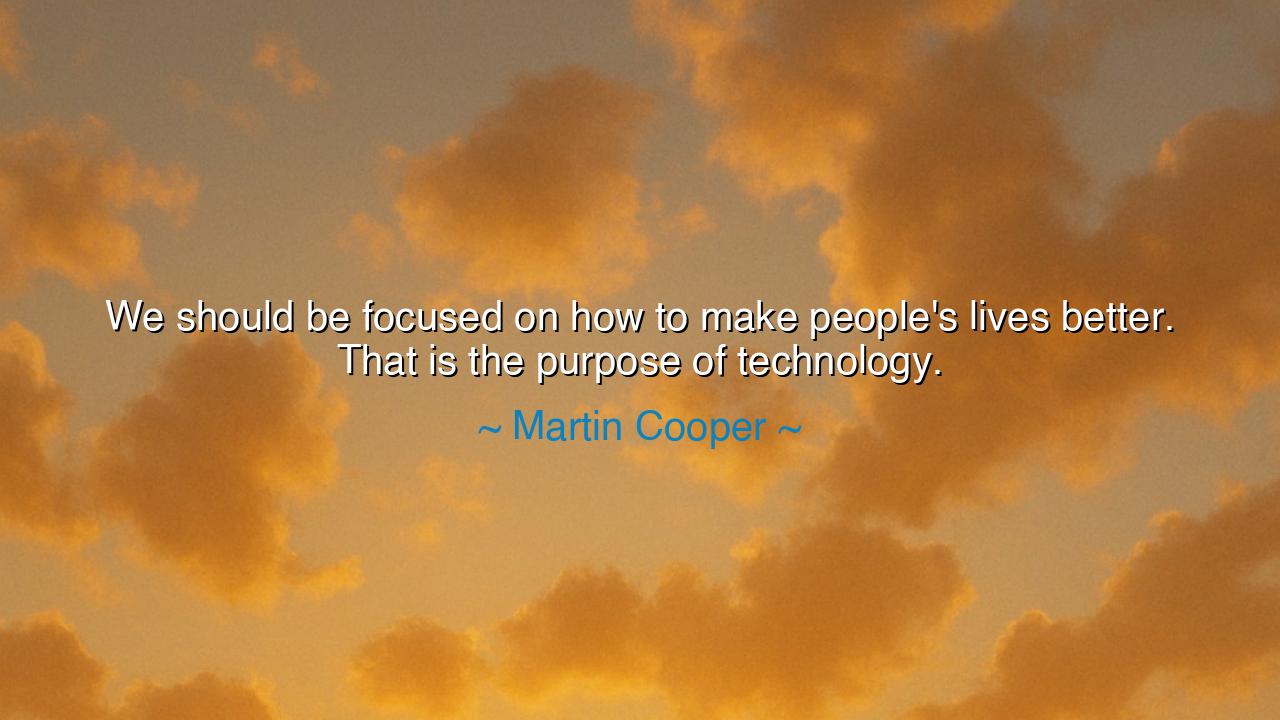
We should be focused on how to make people's lives better. That
We should be focused on how to make people's lives better. That is the purpose of technology.






Hear the words of Martin Cooper, the father of the mobile phone, who declared with clarity and conviction: “We should be focused on how to make people’s lives better. That is the purpose of technology.” These words are not the idle musings of an inventor, but the distilled wisdom of a man who gave birth to a device that forever changed the way humanity communicates. His teaching is both simple and profound: the worth of all invention lies not in its novelty nor in its power, but in its service to humanity.
From the dawn of time, every tool has carried this same truth. When the first humans shaped a stone into a blade, it was not for vanity, but to cut food, to build shelter, to protect the tribe. When fire was tamed, it was not to boast of mastery, but to warm the young, to cook the hunt, to keep away the terrors of the night. The ancients knew, as Cooper reminds us now, that technology is justified only when it lifts the burdens of life, when it adds light to the human journey, when it serves love, survival, and dignity.
Consider Cooper himself, standing in New York City in 1973, holding the first handheld mobile phone. The device was large, clumsy by modern standards, but within it lay a seed that would reshape the world. His vision was not to create a luxury toy, but to make communication free from the chains of wires, to allow people to connect wherever they were. The purpose was human: to bring families closer, to aid businesses, to ensure that no voice need be silenced by distance. From that seed, the forest of modern communication grew, proving his truth—that technology fulfills its destiny when it makes life better.
But history also warns us of the opposite path. For many inventions, when stripped of compassion, have brought sorrow. The same chemistry that gave us medicines also gave us poisons of war. The same nuclear science that lit cities with power also brought forth weapons of devastation. In these shadows we see that invention without purpose is dangerous, and progress without humanity is ruin. Cooper’s words are not only a guide but a warning: technology must remain a servant of humanity, not its master.
So, O seeker of wisdom, let this be your understanding: the true purpose of invention is not profit, nor prestige, nor domination. It is the betterment of human life. Ask always: does this tool bring comfort to the weary? Does it open doors of knowledge? Does it heal the sick, feed the hungry, connect the lonely? If not, then it has strayed from its noble path. The worth of a device, like the worth of a deed, is measured by the lives it uplifts.
The lesson for your own life is clear: when you create, when you labor, when you wield the tools of this age, do so with compassion as your compass. Seek not only to gain, but to give. In your work, in your study, in your craft, let your question always be, “How does this make life better for others?” For in answering that question, you align yourself with the eternal purpose of all technology.
Practical steps follow: use your devices not as distractions, but as instruments of growth. Learn from them, share wisdom through them, and use them to connect with those in need. When faced with choices—whether to build, to buy, or to support—choose those paths that enrich life rather than diminish it. In this way, you honor the spirit of Cooper’s words and become not only a user of technology, but a guardian of its purpose.
Thus, remember this teaching, carved not in stone but in the living fabric of our age: “We should be focused on how to make people’s lives better. That is the purpose of technology.” Let it echo in your heart, guide your actions, and shape your vision. For the destiny of technology is nothing less than the destiny of humanity itself. Use it wisely, and you will carry light into the world.






AAdministratorAdministrator
Welcome, honored guests. Please leave a comment, we will respond soon